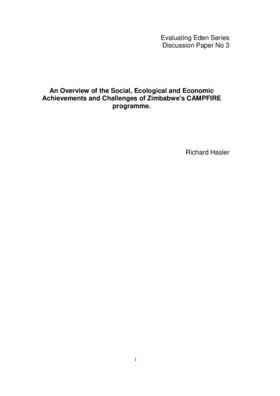Overview of the Social, Ecological and Economic Achievements and Challenges of Zimbabwe's CAMPFIRE Programme, An

Zimbabwe’s CAMPFIRE (Communal Areas Management Programme for Indigenous Resources) has evolved from a humble community wildlife management project to, what some have described as, a social movement, involving 36 of Zimbabwe’s 57 Districts. It has been successful in providing funds to local communities from the use of wildlife resources that would otherwise, have been unavailable to them. ~However, the speed of its evolution has meant that a number of assumptions and issues that have arisen, have not been given the attention they deserved. As such, the many problems concerned with bureaucratisation, equity and political sustainability remain unresolved. In addition, macro-economic changes within Zimbabwe and the need for increased crop production in marginal areas threaten CAMPFIRE’s future. But principally, CAMPFIRE can be criticised for its loss of focus on the ultimate goal, purpose and spirit of the fledgling project: the devolution of legal rights and wildlife management functions to local (village) level.
Cite this publication
Available at https://www.iied.org/7796iied